Comprehensive Report: Academic Integrity, Values, and Game Production
VerifiedAdded on 2023/06/15
|9
|2698
|405
Report
AI Summary
This report provides a comprehensive overview of academic integrity in higher education, emphasizing its values, the consequences of academic misconduct, and a personal reflection on the process of game production. It begins by defining academic integrity, highlighting its importance in fostering honesty, trust, fairness, respect, and responsibility within academic environments. The report details the value of academic integrity for students, universities, and the development of new ideas, while also outlining the implications of misconduct, including cheating, falsification, and plagiarism. Furthermore, the report includes a reflection on the steps taken and difficulties encountered during the production of a game designed to teach students about academic integrity, as well as an analysis of the skills developed throughout the academic year, such as communication and IT skills. The report concludes by reinforcing the significance of academic integrity in maintaining ethical standards and promoting intellectual honesty in higher education.
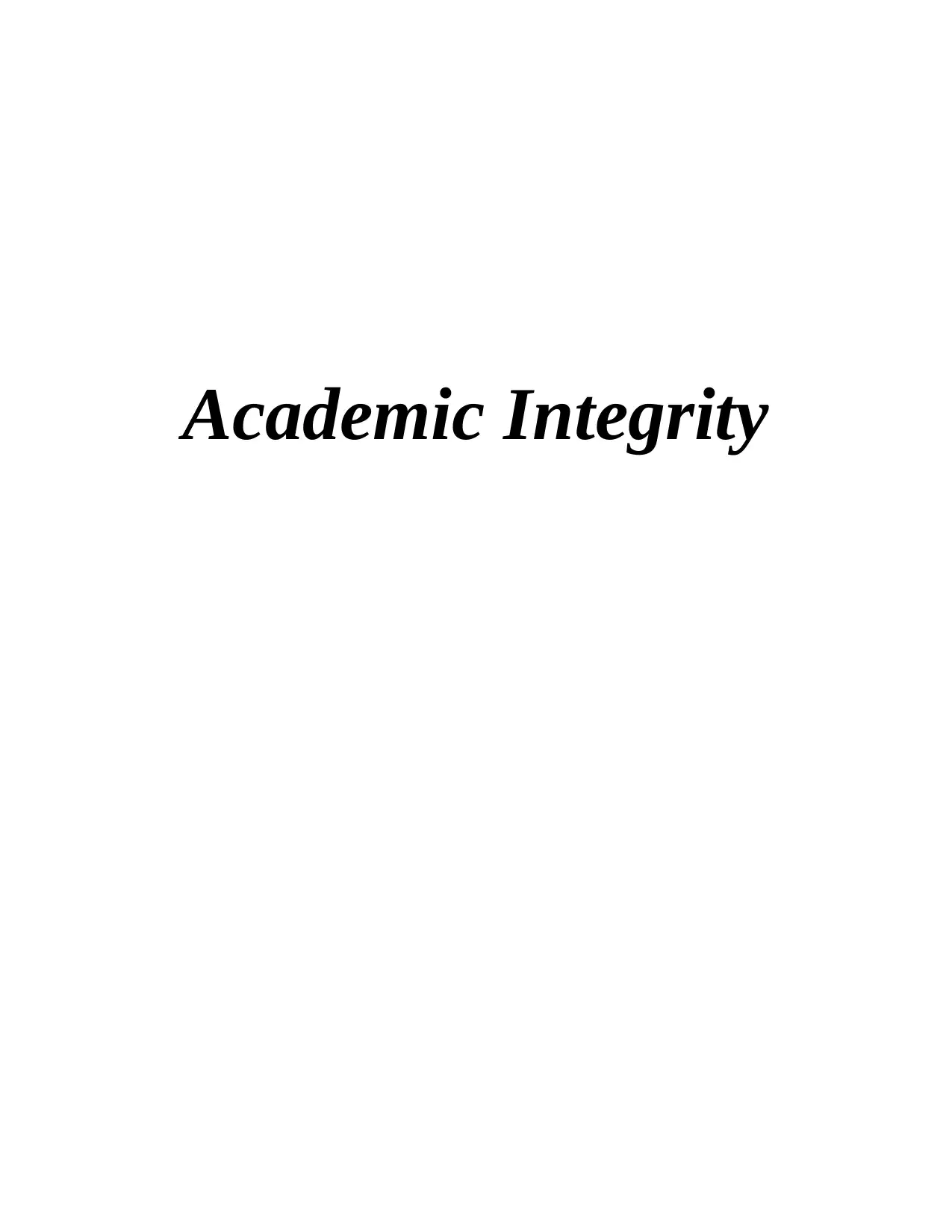
Academic Integrity
Paraphrase This Document
Need a fresh take? Get an instant paraphrase of this document with our AI Paraphraser
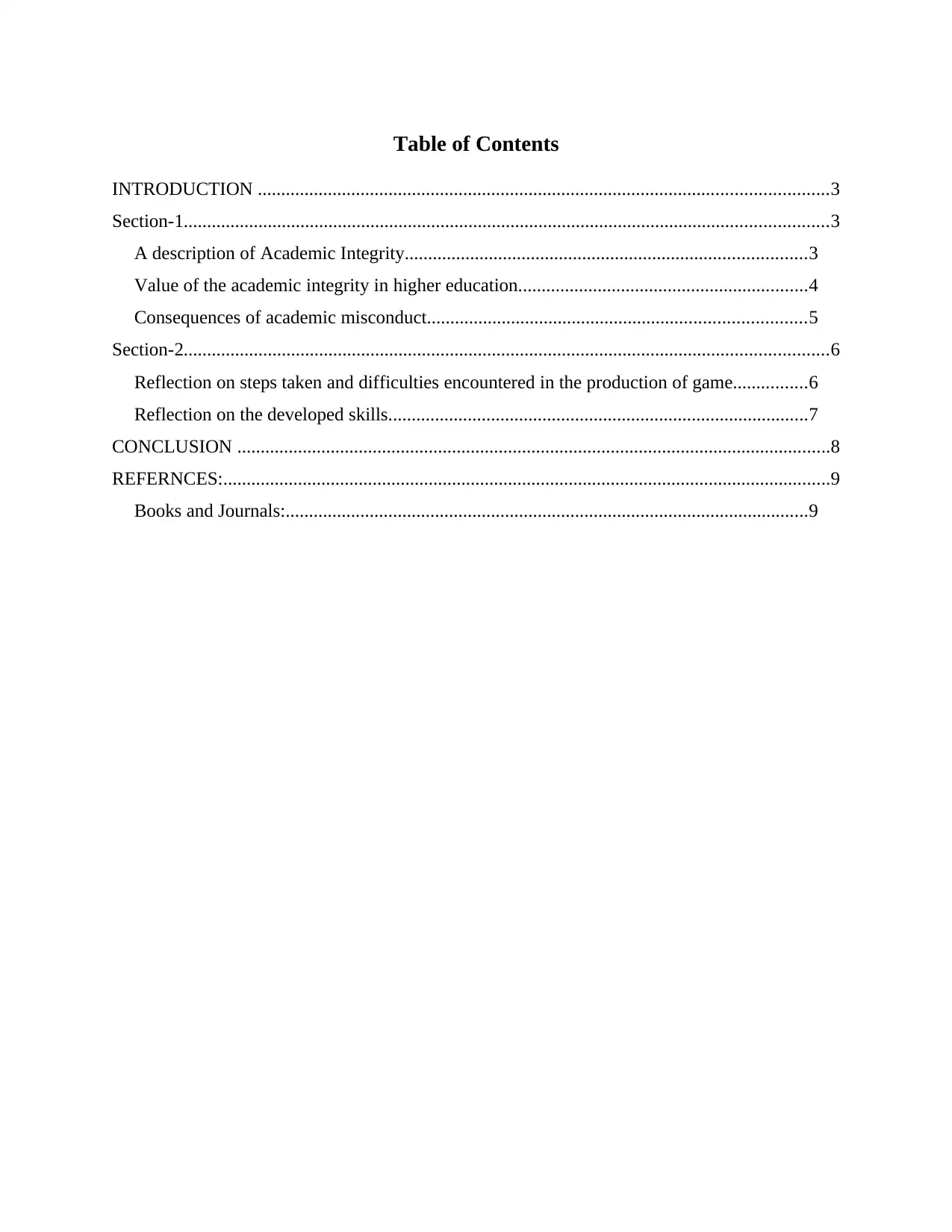
Table of Contents
INTRODUCTION ..........................................................................................................................3
Section-1..........................................................................................................................................3
A description of Academic Integrity......................................................................................3
Value of the academic integrity in higher education..............................................................4
Consequences of academic misconduct.................................................................................5
Section-2..........................................................................................................................................6
Reflection on steps taken and difficulties encountered in the production of game................6
Reflection on the developed skills..........................................................................................7
CONCLUSION ...............................................................................................................................8
REFERNCES:..................................................................................................................................9
Books and Journals:................................................................................................................9
INTRODUCTION ..........................................................................................................................3
Section-1..........................................................................................................................................3
A description of Academic Integrity......................................................................................3
Value of the academic integrity in higher education..............................................................4
Consequences of academic misconduct.................................................................................5
Section-2..........................................................................................................................................6
Reflection on steps taken and difficulties encountered in the production of game................6
Reflection on the developed skills..........................................................................................7
CONCLUSION ...............................................................................................................................8
REFERNCES:..................................................................................................................................9
Books and Journals:................................................................................................................9
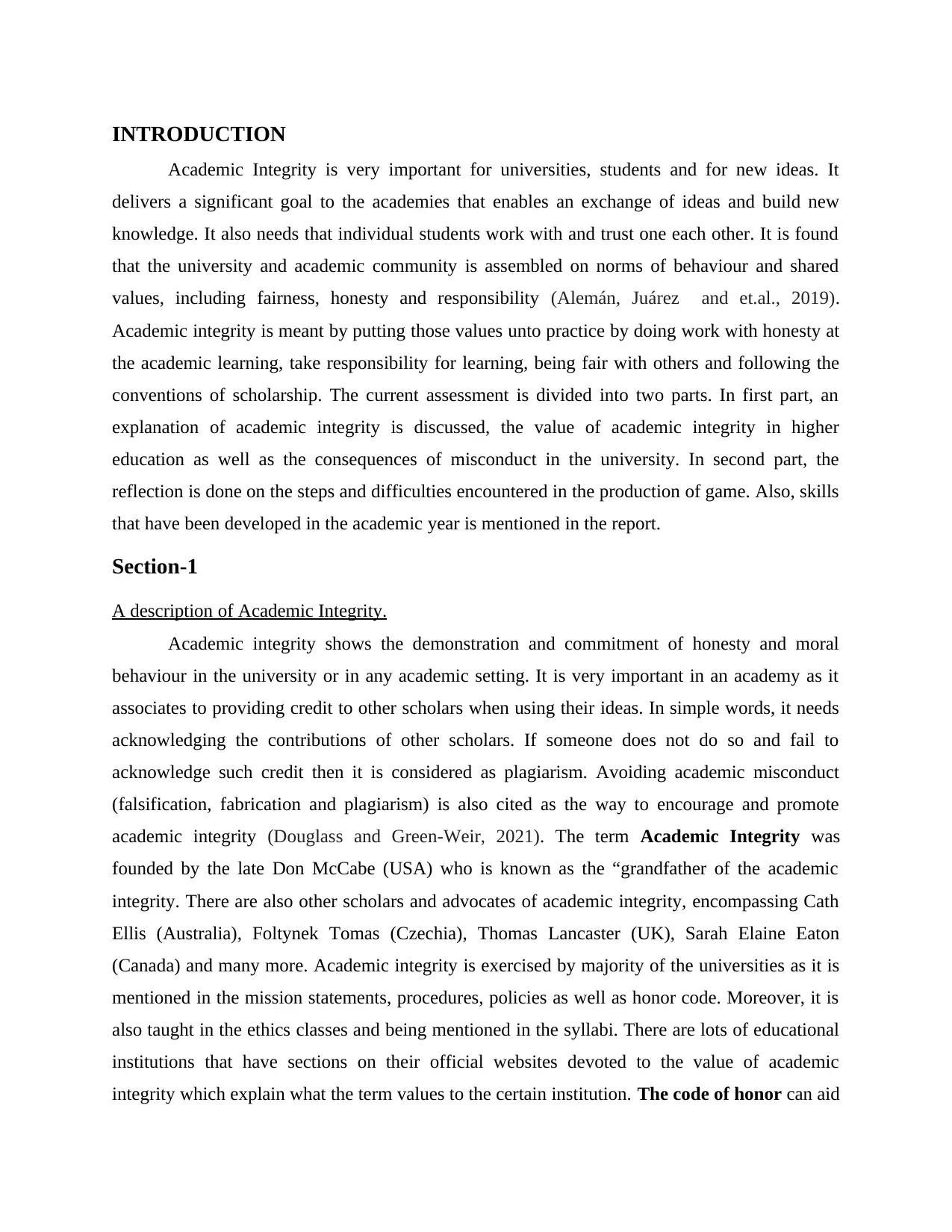
INTRODUCTION
Academic Integrity is very important for universities, students and for new ideas. It
delivers a significant goal to the academies that enables an exchange of ideas and build new
knowledge. It also needs that individual students work with and trust one each other. It is found
that the university and academic community is assembled on norms of behaviour and shared
values, including fairness, honesty and responsibility (Alemán, Juárez and et.al., 2019).
Academic integrity is meant by putting those values unto practice by doing work with honesty at
the academic learning, take responsibility for learning, being fair with others and following the
conventions of scholarship. The current assessment is divided into two parts. In first part, an
explanation of academic integrity is discussed, the value of academic integrity in higher
education as well as the consequences of misconduct in the university. In second part, the
reflection is done on the steps and difficulties encountered in the production of game. Also, skills
that have been developed in the academic year is mentioned in the report.
Section-1
A description of Academic Integrity.
Academic integrity shows the demonstration and commitment of honesty and moral
behaviour in the university or in any academic setting. It is very important in an academy as it
associates to providing credit to other scholars when using their ideas. In simple words, it needs
acknowledging the contributions of other scholars. If someone does not do so and fail to
acknowledge such credit then it is considered as plagiarism. Avoiding academic misconduct
(falsification, fabrication and plagiarism) is also cited as the way to encourage and promote
academic integrity (Douglass and Green-Weir, 2021). The term Academic Integrity was
founded by the late Don McCabe (USA) who is known as the “grandfather of the academic
integrity. There are also other scholars and advocates of academic integrity, encompassing Cath
Ellis (Australia), Foltynek Tomas (Czechia), Thomas Lancaster (UK), Sarah Elaine Eaton
(Canada) and many more. Academic integrity is exercised by majority of the universities as it is
mentioned in the mission statements, procedures, policies as well as honor code. Moreover, it is
also taught in the ethics classes and being mentioned in the syllabi. There are lots of educational
institutions that have sections on their official websites devoted to the value of academic
integrity which explain what the term values to the certain institution. The code of honor can aid
Academic Integrity is very important for universities, students and for new ideas. It
delivers a significant goal to the academies that enables an exchange of ideas and build new
knowledge. It also needs that individual students work with and trust one each other. It is found
that the university and academic community is assembled on norms of behaviour and shared
values, including fairness, honesty and responsibility (Alemán, Juárez and et.al., 2019).
Academic integrity is meant by putting those values unto practice by doing work with honesty at
the academic learning, take responsibility for learning, being fair with others and following the
conventions of scholarship. The current assessment is divided into two parts. In first part, an
explanation of academic integrity is discussed, the value of academic integrity in higher
education as well as the consequences of misconduct in the university. In second part, the
reflection is done on the steps and difficulties encountered in the production of game. Also, skills
that have been developed in the academic year is mentioned in the report.
Section-1
A description of Academic Integrity.
Academic integrity shows the demonstration and commitment of honesty and moral
behaviour in the university or in any academic setting. It is very important in an academy as it
associates to providing credit to other scholars when using their ideas. In simple words, it needs
acknowledging the contributions of other scholars. If someone does not do so and fail to
acknowledge such credit then it is considered as plagiarism. Avoiding academic misconduct
(falsification, fabrication and plagiarism) is also cited as the way to encourage and promote
academic integrity (Douglass and Green-Weir, 2021). The term Academic Integrity was
founded by the late Don McCabe (USA) who is known as the “grandfather of the academic
integrity. There are also other scholars and advocates of academic integrity, encompassing Cath
Ellis (Australia), Foltynek Tomas (Czechia), Thomas Lancaster (UK), Sarah Elaine Eaton
(Canada) and many more. Academic integrity is exercised by majority of the universities as it is
mentioned in the mission statements, procedures, policies as well as honor code. Moreover, it is
also taught in the ethics classes and being mentioned in the syllabi. There are lots of educational
institutions that have sections on their official websites devoted to the value of academic
integrity which explain what the term values to the certain institution. The code of honor can aid
⊘ This is a preview!⊘
Do you want full access?
Subscribe today to unlock all pages.

Trusted by 1+ million students worldwide
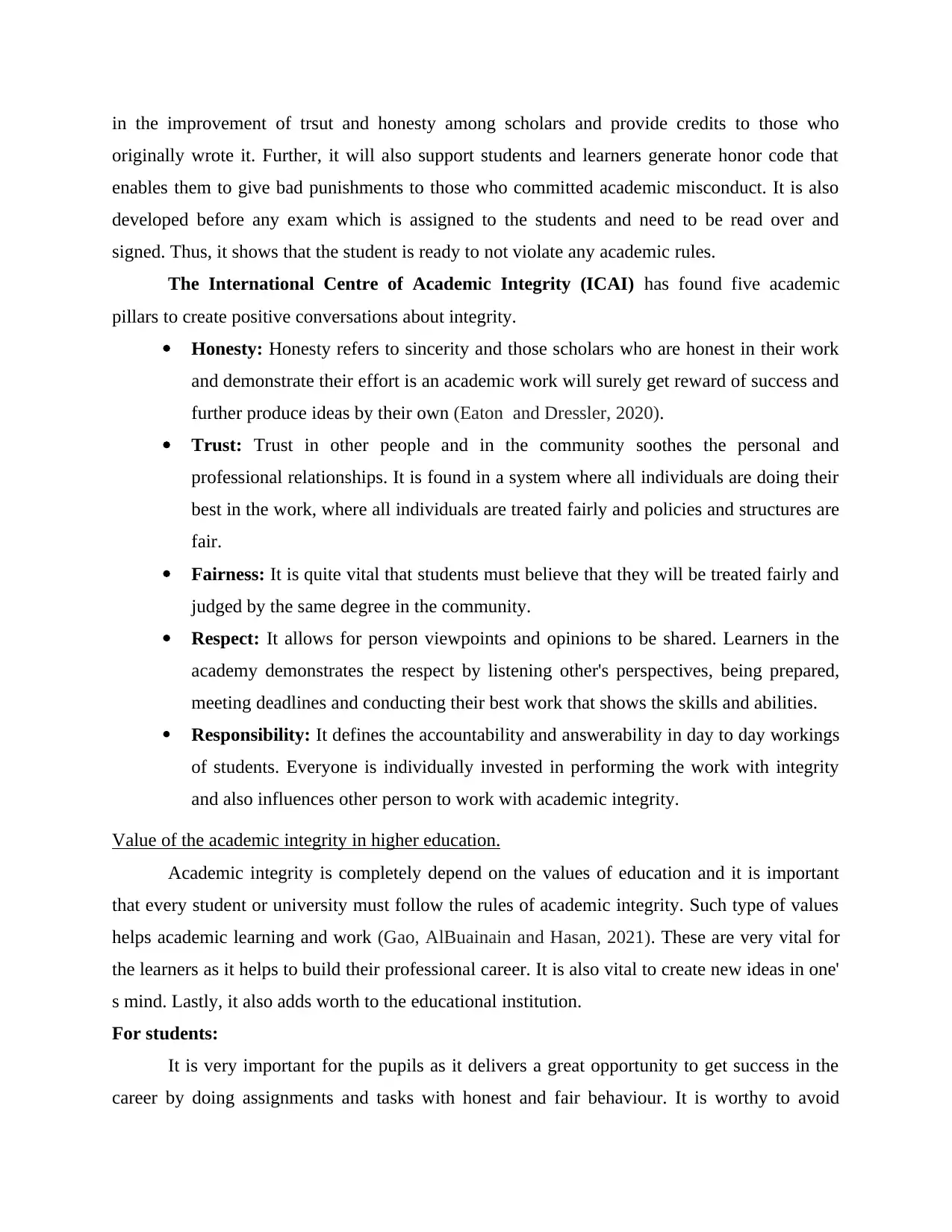
in the improvement of trsut and honesty among scholars and provide credits to those who
originally wrote it. Further, it will also support students and learners generate honor code that
enables them to give bad punishments to those who committed academic misconduct. It is also
developed before any exam which is assigned to the students and need to be read over and
signed. Thus, it shows that the student is ready to not violate any academic rules.
The International Centre of Academic Integrity (ICAI) has found five academic
pillars to create positive conversations about integrity.
Honesty: Honesty refers to sincerity and those scholars who are honest in their work
and demonstrate their effort is an academic work will surely get reward of success and
further produce ideas by their own (Eaton and Dressler, 2020).
Trust: Trust in other people and in the community soothes the personal and
professional relationships. It is found in a system where all individuals are doing their
best in the work, where all individuals are treated fairly and policies and structures are
fair.
Fairness: It is quite vital that students must believe that they will be treated fairly and
judged by the same degree in the community.
Respect: It allows for person viewpoints and opinions to be shared. Learners in the
academy demonstrates the respect by listening other's perspectives, being prepared,
meeting deadlines and conducting their best work that shows the skills and abilities.
Responsibility: It defines the accountability and answerability in day to day workings
of students. Everyone is individually invested in performing the work with integrity
and also influences other person to work with academic integrity.
Value of the academic integrity in higher education.
Academic integrity is completely depend on the values of education and it is important
that every student or university must follow the rules of academic integrity. Such type of values
helps academic learning and work (Gao, AlBuainain and Hasan, 2021). These are very vital for
the learners as it helps to build their professional career. It is also vital to create new ideas in one'
s mind. Lastly, it also adds worth to the educational institution.
For students:
It is very important for the pupils as it delivers a great opportunity to get success in the
career by doing assignments and tasks with honest and fair behaviour. It is worthy to avoid
originally wrote it. Further, it will also support students and learners generate honor code that
enables them to give bad punishments to those who committed academic misconduct. It is also
developed before any exam which is assigned to the students and need to be read over and
signed. Thus, it shows that the student is ready to not violate any academic rules.
The International Centre of Academic Integrity (ICAI) has found five academic
pillars to create positive conversations about integrity.
Honesty: Honesty refers to sincerity and those scholars who are honest in their work
and demonstrate their effort is an academic work will surely get reward of success and
further produce ideas by their own (Eaton and Dressler, 2020).
Trust: Trust in other people and in the community soothes the personal and
professional relationships. It is found in a system where all individuals are doing their
best in the work, where all individuals are treated fairly and policies and structures are
fair.
Fairness: It is quite vital that students must believe that they will be treated fairly and
judged by the same degree in the community.
Respect: It allows for person viewpoints and opinions to be shared. Learners in the
academy demonstrates the respect by listening other's perspectives, being prepared,
meeting deadlines and conducting their best work that shows the skills and abilities.
Responsibility: It defines the accountability and answerability in day to day workings
of students. Everyone is individually invested in performing the work with integrity
and also influences other person to work with academic integrity.
Value of the academic integrity in higher education.
Academic integrity is completely depend on the values of education and it is important
that every student or university must follow the rules of academic integrity. Such type of values
helps academic learning and work (Gao, AlBuainain and Hasan, 2021). These are very vital for
the learners as it helps to build their professional career. It is also vital to create new ideas in one'
s mind. Lastly, it also adds worth to the educational institution.
For students:
It is very important for the pupils as it delivers a great opportunity to get success in the
career by doing assignments and tasks with honest and fair behaviour. It is worthy to avoid
Paraphrase This Document
Need a fresh take? Get an instant paraphrase of this document with our AI Paraphraser
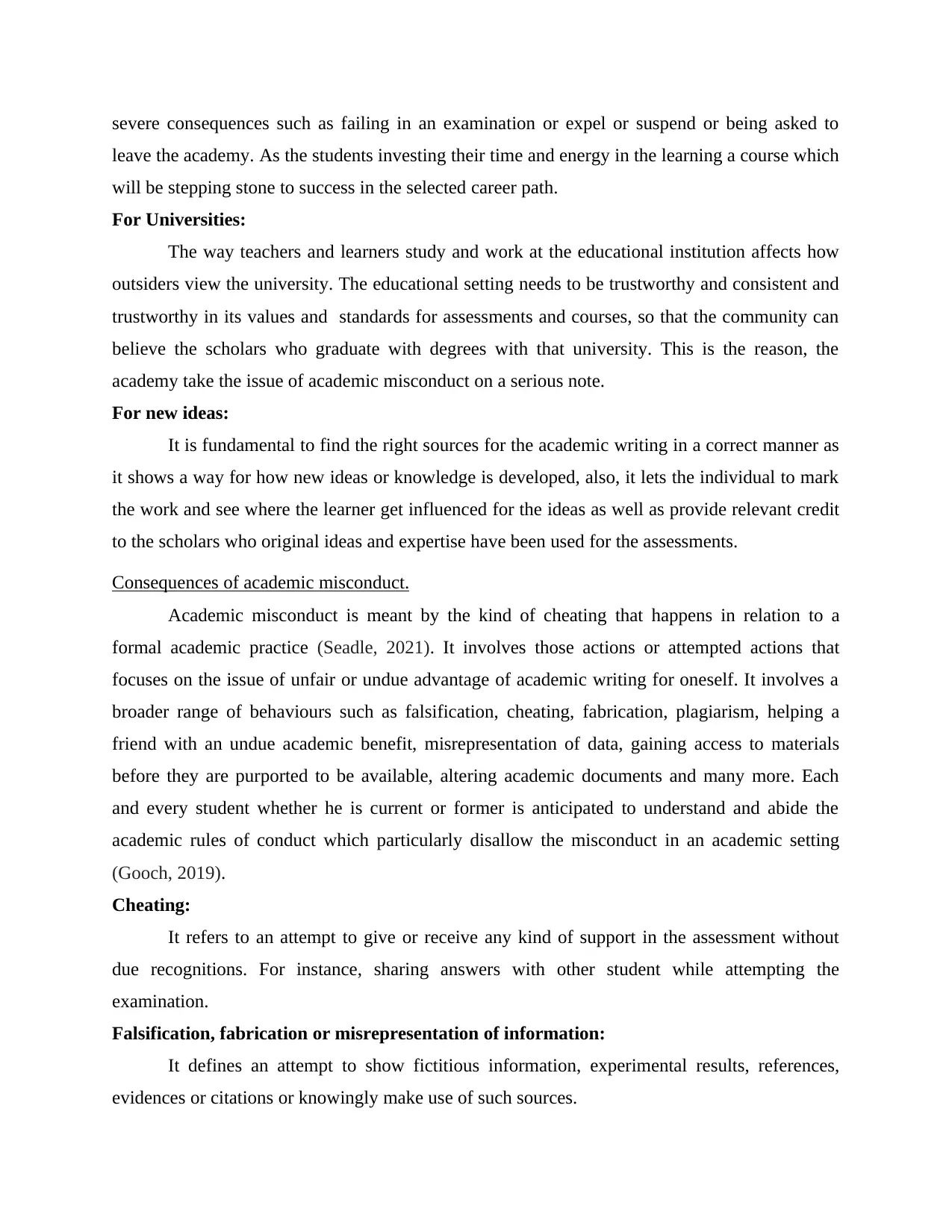
severe consequences such as failing in an examination or expel or suspend or being asked to
leave the academy. As the students investing their time and energy in the learning a course which
will be stepping stone to success in the selected career path.
For Universities:
The way teachers and learners study and work at the educational institution affects how
outsiders view the university. The educational setting needs to be trustworthy and consistent and
trustworthy in its values and standards for assessments and courses, so that the community can
believe the scholars who graduate with degrees with that university. This is the reason, the
academy take the issue of academic misconduct on a serious note.
For new ideas:
It is fundamental to find the right sources for the academic writing in a correct manner as
it shows a way for how new ideas or knowledge is developed, also, it lets the individual to mark
the work and see where the learner get influenced for the ideas as well as provide relevant credit
to the scholars who original ideas and expertise have been used for the assessments.
Consequences of academic misconduct.
Academic misconduct is meant by the kind of cheating that happens in relation to a
formal academic practice (Seadle, 2021). It involves those actions or attempted actions that
focuses on the issue of unfair or undue advantage of academic writing for oneself. It involves a
broader range of behaviours such as falsification, cheating, fabrication, plagiarism, helping a
friend with an undue academic benefit, misrepresentation of data, gaining access to materials
before they are purported to be available, altering academic documents and many more. Each
and every student whether he is current or former is anticipated to understand and abide the
academic rules of conduct which particularly disallow the misconduct in an academic setting
(Gooch, 2019).
Cheating:
It refers to an attempt to give or receive any kind of support in the assessment without
due recognitions. For instance, sharing answers with other student while attempting the
examination.
Falsification, fabrication or misrepresentation of information:
It defines an attempt to show fictitious information, experimental results, references,
evidences or citations or knowingly make use of such sources.
leave the academy. As the students investing their time and energy in the learning a course which
will be stepping stone to success in the selected career path.
For Universities:
The way teachers and learners study and work at the educational institution affects how
outsiders view the university. The educational setting needs to be trustworthy and consistent and
trustworthy in its values and standards for assessments and courses, so that the community can
believe the scholars who graduate with degrees with that university. This is the reason, the
academy take the issue of academic misconduct on a serious note.
For new ideas:
It is fundamental to find the right sources for the academic writing in a correct manner as
it shows a way for how new ideas or knowledge is developed, also, it lets the individual to mark
the work and see where the learner get influenced for the ideas as well as provide relevant credit
to the scholars who original ideas and expertise have been used for the assessments.
Consequences of academic misconduct.
Academic misconduct is meant by the kind of cheating that happens in relation to a
formal academic practice (Seadle, 2021). It involves those actions or attempted actions that
focuses on the issue of unfair or undue advantage of academic writing for oneself. It involves a
broader range of behaviours such as falsification, cheating, fabrication, plagiarism, helping a
friend with an undue academic benefit, misrepresentation of data, gaining access to materials
before they are purported to be available, altering academic documents and many more. Each
and every student whether he is current or former is anticipated to understand and abide the
academic rules of conduct which particularly disallow the misconduct in an academic setting
(Gooch, 2019).
Cheating:
It refers to an attempt to give or receive any kind of support in the assessment without
due recognitions. For instance, sharing answers with other student while attempting the
examination.
Falsification, fabrication or misrepresentation of information:
It defines an attempt to show fictitious information, experimental results, references,
evidences or citations or knowingly make use of such sources.
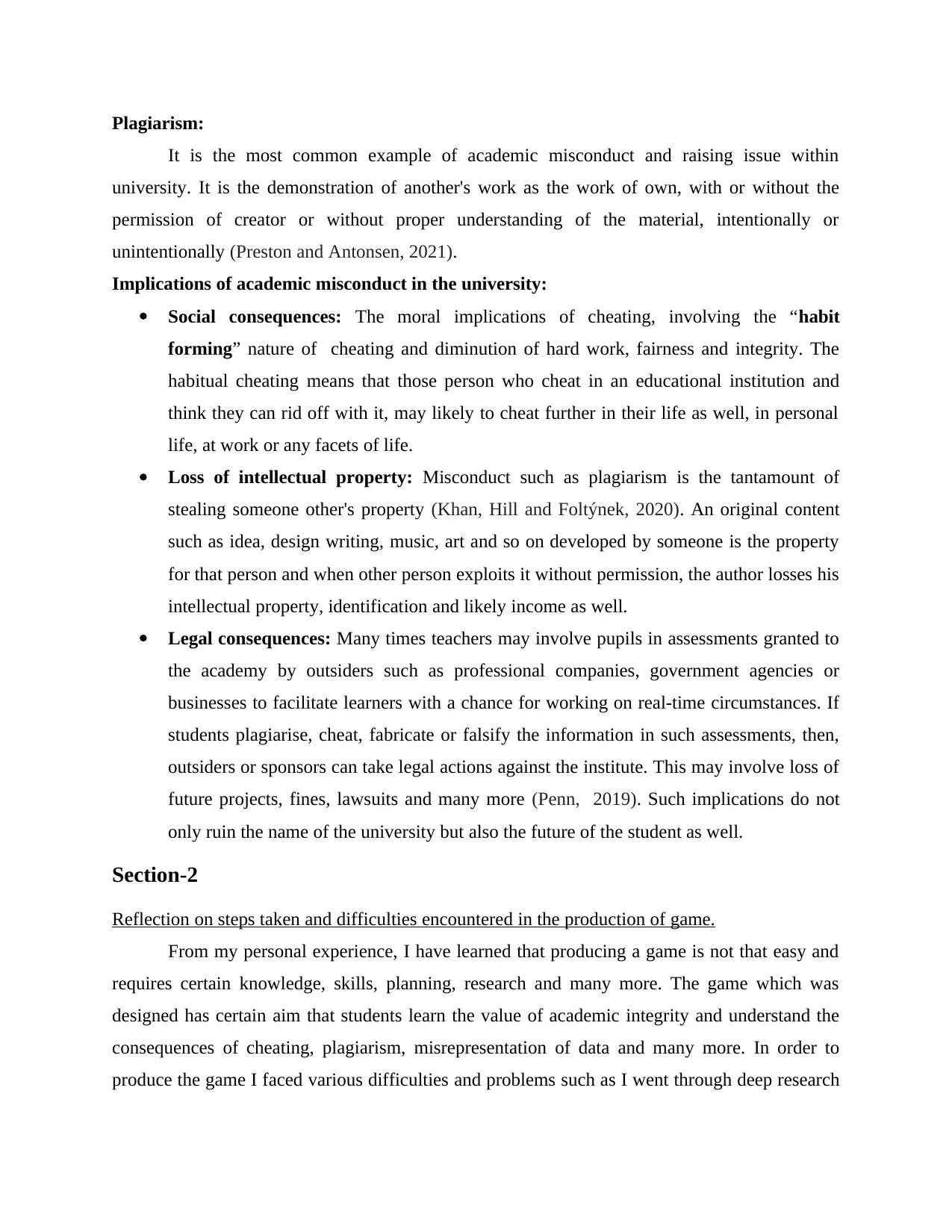
Plagiarism:
It is the most common example of academic misconduct and raising issue within
university. It is the demonstration of another's work as the work of own, with or without the
permission of creator or without proper understanding of the material, intentionally or
unintentionally (Preston and Antonsen, 2021).
Implications of academic misconduct in the university:
Social consequences: The moral implications of cheating, involving the “habit
forming” nature of cheating and diminution of hard work, fairness and integrity. The
habitual cheating means that those person who cheat in an educational institution and
think they can rid off with it, may likely to cheat further in their life as well, in personal
life, at work or any facets of life.
Loss of intellectual property: Misconduct such as plagiarism is the tantamount of
stealing someone other's property (Khan, Hill and Foltýnek, 2020). An original content
such as idea, design writing, music, art and so on developed by someone is the property
for that person and when other person exploits it without permission, the author losses his
intellectual property, identification and likely income as well.
Legal consequences: Many times teachers may involve pupils in assessments granted to
the academy by outsiders such as professional companies, government agencies or
businesses to facilitate learners with a chance for working on real-time circumstances. If
students plagiarise, cheat, fabricate or falsify the information in such assessments, then,
outsiders or sponsors can take legal actions against the institute. This may involve loss of
future projects, fines, lawsuits and many more (Penn, 2019). Such implications do not
only ruin the name of the university but also the future of the student as well.
Section-2
Reflection on steps taken and difficulties encountered in the production of game.
From my personal experience, I have learned that producing a game is not that easy and
requires certain knowledge, skills, planning, research and many more. The game which was
designed has certain aim that students learn the value of academic integrity and understand the
consequences of cheating, plagiarism, misrepresentation of data and many more. In order to
produce the game I faced various difficulties and problems such as I went through deep research
It is the most common example of academic misconduct and raising issue within
university. It is the demonstration of another's work as the work of own, with or without the
permission of creator or without proper understanding of the material, intentionally or
unintentionally (Preston and Antonsen, 2021).
Implications of academic misconduct in the university:
Social consequences: The moral implications of cheating, involving the “habit
forming” nature of cheating and diminution of hard work, fairness and integrity. The
habitual cheating means that those person who cheat in an educational institution and
think they can rid off with it, may likely to cheat further in their life as well, in personal
life, at work or any facets of life.
Loss of intellectual property: Misconduct such as plagiarism is the tantamount of
stealing someone other's property (Khan, Hill and Foltýnek, 2020). An original content
such as idea, design writing, music, art and so on developed by someone is the property
for that person and when other person exploits it without permission, the author losses his
intellectual property, identification and likely income as well.
Legal consequences: Many times teachers may involve pupils in assessments granted to
the academy by outsiders such as professional companies, government agencies or
businesses to facilitate learners with a chance for working on real-time circumstances. If
students plagiarise, cheat, fabricate or falsify the information in such assessments, then,
outsiders or sponsors can take legal actions against the institute. This may involve loss of
future projects, fines, lawsuits and many more (Penn, 2019). Such implications do not
only ruin the name of the university but also the future of the student as well.
Section-2
Reflection on steps taken and difficulties encountered in the production of game.
From my personal experience, I have learned that producing a game is not that easy and
requires certain knowledge, skills, planning, research and many more. The game which was
designed has certain aim that students learn the value of academic integrity and understand the
consequences of cheating, plagiarism, misrepresentation of data and many more. In order to
produce the game I faced various difficulties and problems such as I went through deep research
⊘ This is a preview!⊘
Do you want full access?
Subscribe today to unlock all pages.

Trusted by 1+ million students worldwide
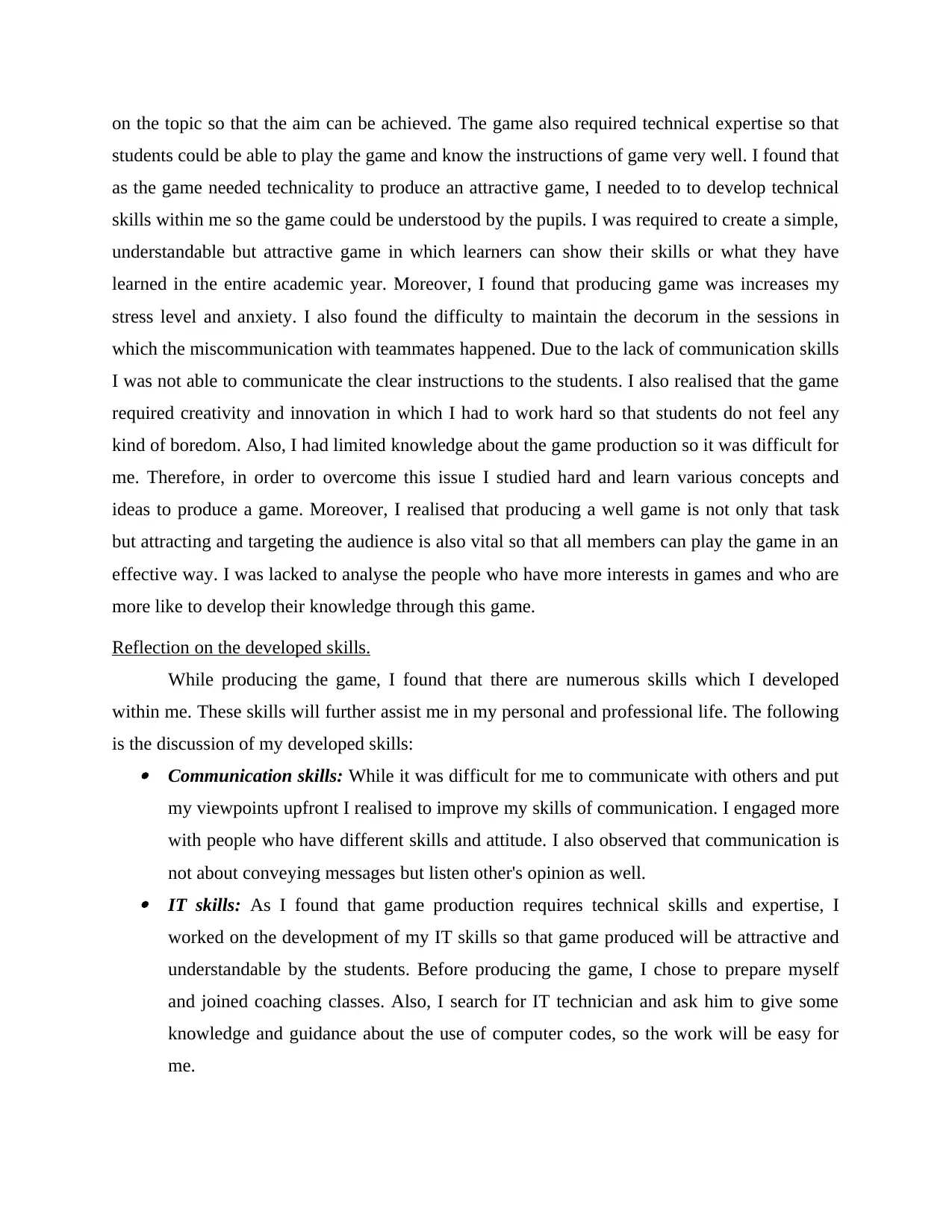
on the topic so that the aim can be achieved. The game also required technical expertise so that
students could be able to play the game and know the instructions of game very well. I found that
as the game needed technicality to produce an attractive game, I needed to to develop technical
skills within me so the game could be understood by the pupils. I was required to create a simple,
understandable but attractive game in which learners can show their skills or what they have
learned in the entire academic year. Moreover, I found that producing game was increases my
stress level and anxiety. I also found the difficulty to maintain the decorum in the sessions in
which the miscommunication with teammates happened. Due to the lack of communication skills
I was not able to communicate the clear instructions to the students. I also realised that the game
required creativity and innovation in which I had to work hard so that students do not feel any
kind of boredom. Also, I had limited knowledge about the game production so it was difficult for
me. Therefore, in order to overcome this issue I studied hard and learn various concepts and
ideas to produce a game. Moreover, I realised that producing a well game is not only that task
but attracting and targeting the audience is also vital so that all members can play the game in an
effective way. I was lacked to analyse the people who have more interests in games and who are
more like to develop their knowledge through this game.
Reflection on the developed skills.
While producing the game, I found that there are numerous skills which I developed
within me. These skills will further assist me in my personal and professional life. The following
is the discussion of my developed skills: Communication skills: While it was difficult for me to communicate with others and put
my viewpoints upfront I realised to improve my skills of communication. I engaged more
with people who have different skills and attitude. I also observed that communication is
not about conveying messages but listen other's opinion as well. IT skills: As I found that game production requires technical skills and expertise, I
worked on the development of my IT skills so that game produced will be attractive and
understandable by the students. Before producing the game, I chose to prepare myself
and joined coaching classes. Also, I search for IT technician and ask him to give some
knowledge and guidance about the use of computer codes, so the work will be easy for
me.
students could be able to play the game and know the instructions of game very well. I found that
as the game needed technicality to produce an attractive game, I needed to to develop technical
skills within me so the game could be understood by the pupils. I was required to create a simple,
understandable but attractive game in which learners can show their skills or what they have
learned in the entire academic year. Moreover, I found that producing game was increases my
stress level and anxiety. I also found the difficulty to maintain the decorum in the sessions in
which the miscommunication with teammates happened. Due to the lack of communication skills
I was not able to communicate the clear instructions to the students. I also realised that the game
required creativity and innovation in which I had to work hard so that students do not feel any
kind of boredom. Also, I had limited knowledge about the game production so it was difficult for
me. Therefore, in order to overcome this issue I studied hard and learn various concepts and
ideas to produce a game. Moreover, I realised that producing a well game is not only that task
but attracting and targeting the audience is also vital so that all members can play the game in an
effective way. I was lacked to analyse the people who have more interests in games and who are
more like to develop their knowledge through this game.
Reflection on the developed skills.
While producing the game, I found that there are numerous skills which I developed
within me. These skills will further assist me in my personal and professional life. The following
is the discussion of my developed skills: Communication skills: While it was difficult for me to communicate with others and put
my viewpoints upfront I realised to improve my skills of communication. I engaged more
with people who have different skills and attitude. I also observed that communication is
not about conveying messages but listen other's opinion as well. IT skills: As I found that game production requires technical skills and expertise, I
worked on the development of my IT skills so that game produced will be attractive and
understandable by the students. Before producing the game, I chose to prepare myself
and joined coaching classes. Also, I search for IT technician and ask him to give some
knowledge and guidance about the use of computer codes, so the work will be easy for
me.
Paraphrase This Document
Need a fresh take? Get an instant paraphrase of this document with our AI Paraphraser
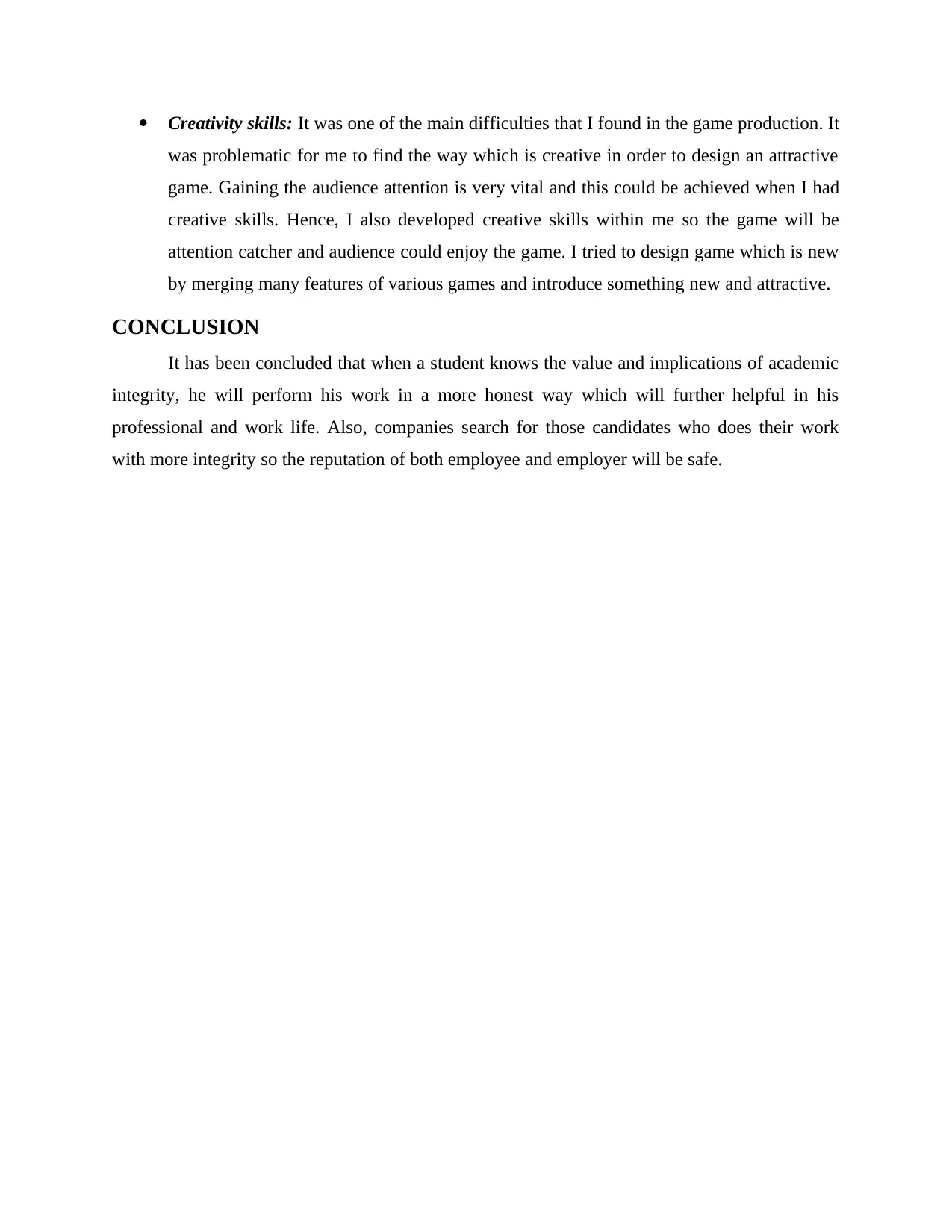
Creativity skills: It was one of the main difficulties that I found in the game production. It
was problematic for me to find the way which is creative in order to design an attractive
game. Gaining the audience attention is very vital and this could be achieved when I had
creative skills. Hence, I also developed creative skills within me so the game will be
attention catcher and audience could enjoy the game. I tried to design game which is new
by merging many features of various games and introduce something new and attractive.
CONCLUSION
It has been concluded that when a student knows the value and implications of academic
integrity, he will perform his work in a more honest way which will further helpful in his
professional and work life. Also, companies search for those candidates who does their work
with more integrity so the reputation of both employee and employer will be safe.
was problematic for me to find the way which is creative in order to design an attractive
game. Gaining the audience attention is very vital and this could be achieved when I had
creative skills. Hence, I also developed creative skills within me so the game will be
attention catcher and audience could enjoy the game. I tried to design game which is new
by merging many features of various games and introduce something new and attractive.
CONCLUSION
It has been concluded that when a student knows the value and implications of academic
integrity, he will perform his work in a more honest way which will further helpful in his
professional and work life. Also, companies search for those candidates who does their work
with more integrity so the reputation of both employee and employer will be safe.
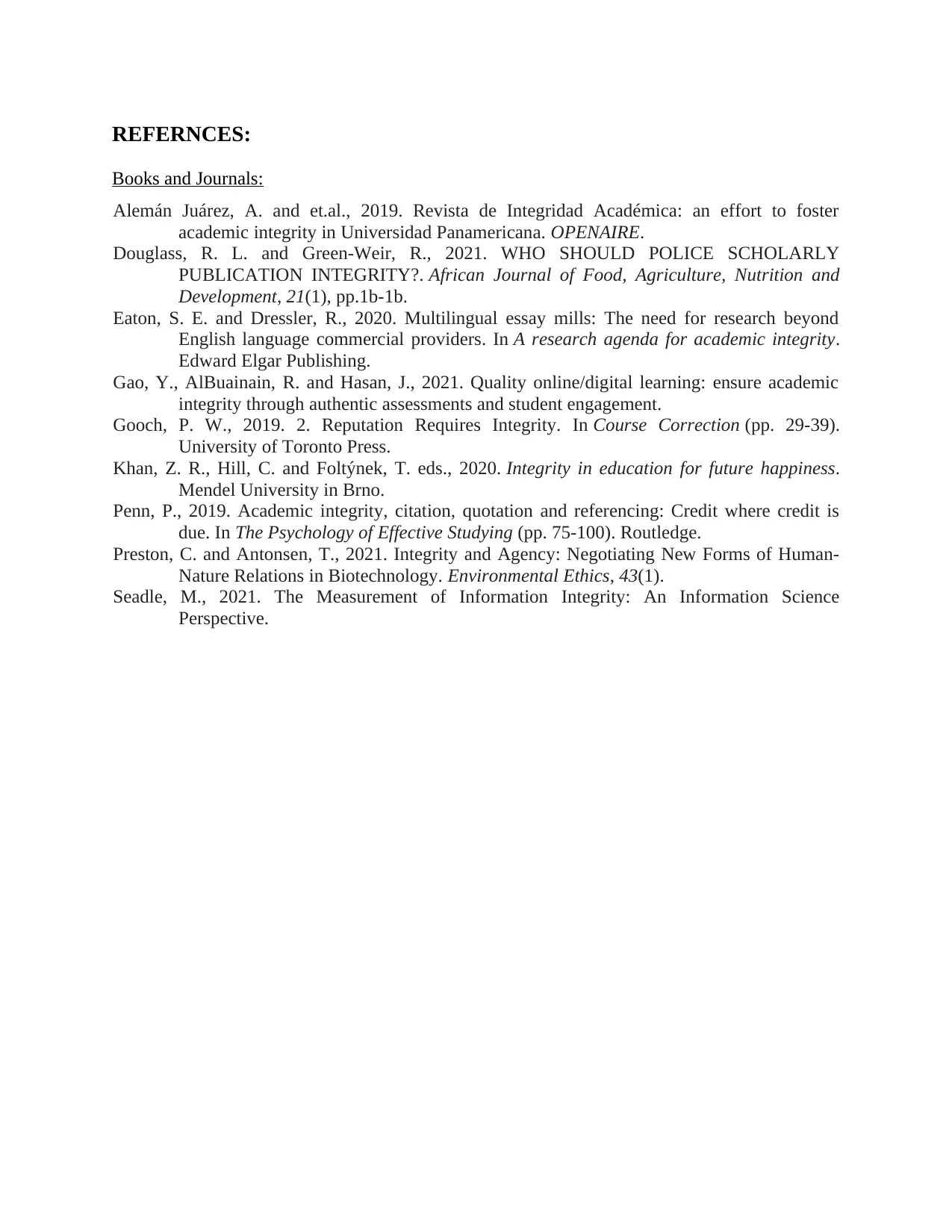
REFERNCES:
Books and Journals:
Alemán Juárez, A. and et.al., 2019. Revista de Integridad Académica: an effort to foster
academic integrity in Universidad Panamericana. OPENAIRE.
Douglass, R. L. and Green-Weir, R., 2021. WHO SHOULD POLICE SCHOLARLY
PUBLICATION INTEGRITY?. African Journal of Food, Agriculture, Nutrition and
Development, 21(1), pp.1b-1b.
Eaton, S. E. and Dressler, R., 2020. Multilingual essay mills: The need for research beyond
English language commercial providers. In A research agenda for academic integrity.
Edward Elgar Publishing.
Gao, Y., AlBuainain, R. and Hasan, J., 2021. Quality online/digital learning: ensure academic
integrity through authentic assessments and student engagement.
Gooch, P. W., 2019. 2. Reputation Requires Integrity. In Course Correction (pp. 29-39).
University of Toronto Press.
Khan, Z. R., Hill, C. and Foltýnek, T. eds., 2020. Integrity in education for future happiness.
Mendel University in Brno.
Penn, P., 2019. Academic integrity, citation, quotation and referencing: Credit where credit is
due. In The Psychology of Effective Studying (pp. 75-100). Routledge.
Preston, C. and Antonsen, T., 2021. Integrity and Agency: Negotiating New Forms of Human-
Nature Relations in Biotechnology. Environmental Ethics, 43(1).
Seadle, M., 2021. The Measurement of Information Integrity: An Information Science
Perspective.
Books and Journals:
Alemán Juárez, A. and et.al., 2019. Revista de Integridad Académica: an effort to foster
academic integrity in Universidad Panamericana. OPENAIRE.
Douglass, R. L. and Green-Weir, R., 2021. WHO SHOULD POLICE SCHOLARLY
PUBLICATION INTEGRITY?. African Journal of Food, Agriculture, Nutrition and
Development, 21(1), pp.1b-1b.
Eaton, S. E. and Dressler, R., 2020. Multilingual essay mills: The need for research beyond
English language commercial providers. In A research agenda for academic integrity.
Edward Elgar Publishing.
Gao, Y., AlBuainain, R. and Hasan, J., 2021. Quality online/digital learning: ensure academic
integrity through authentic assessments and student engagement.
Gooch, P. W., 2019. 2. Reputation Requires Integrity. In Course Correction (pp. 29-39).
University of Toronto Press.
Khan, Z. R., Hill, C. and Foltýnek, T. eds., 2020. Integrity in education for future happiness.
Mendel University in Brno.
Penn, P., 2019. Academic integrity, citation, quotation and referencing: Credit where credit is
due. In The Psychology of Effective Studying (pp. 75-100). Routledge.
Preston, C. and Antonsen, T., 2021. Integrity and Agency: Negotiating New Forms of Human-
Nature Relations in Biotechnology. Environmental Ethics, 43(1).
Seadle, M., 2021. The Measurement of Information Integrity: An Information Science
Perspective.
⊘ This is a preview!⊘
Do you want full access?
Subscribe today to unlock all pages.

Trusted by 1+ million students worldwide
1 out of 9
Related Documents
Your All-in-One AI-Powered Toolkit for Academic Success.
+13062052269
info@desklib.com
Available 24*7 on WhatsApp / Email
![[object Object]](/_next/static/media/star-bottom.7253800d.svg)
Unlock your academic potential
Copyright © 2020–2026 A2Z Services. All Rights Reserved. Developed and managed by ZUCOL.





